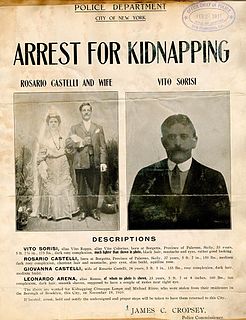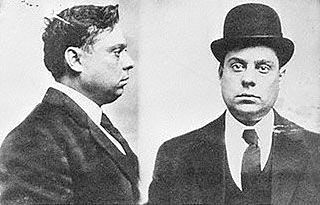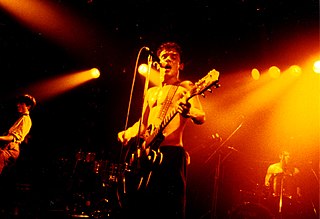A drug cartel is any criminal organization with the intention of supplying drug trafficking operations. They range from loosely managed agreements among various drug traffickers to formalized commercial enterprises. The term was applied when the largest trafficking organizations reached an agreement to coordinate the production and distribution of cocaine. Since that agreement was broken up, drug cartels are no longer actually cartels, but the term stuck and it is now popularly used to refer to any criminal narcotics related organization.
A gangster is a criminal who is a member of a gang. Some gangs are considered to be part of organized crime. Gangsters are also called mobsters, a term derived from mob and the suffix -ster.
Gangs provide a level of organization and resources that support much larger and more complex criminal transactions than an individual criminal could achieve. Gangsters have been active for many years in countries around the world.

Black Hand was a type of Italian and Italian-American extortion racket. It was a method of extortion, not a criminal organization as such, though gangsters of Camorra and the Mafia practiced it.
A protection racket is a scheme whereby a group provides protection to businesses or other groups through violence outside the sanction of the law—in other words, a racket that sells security, traditionally physical security but now also computer security. Through the credible threat of violence, the racketeers deter people from swindling, robbing, injuring, sabotaging or otherwise harming their clients. Protection rackets tend to appear in markets where the police and judiciary cannot be counted on to provide legal protection, either because of incompetence or illegality.

The Mexican Mafia, also known as La Eme, is a highly organized Mexican American criminal organization in the United States. Despite its name, the Mexican Mafia did not originate in Mexico, and is entirely a U.S. criminal prison organization. Law enforcement officials report that the Mexican Mafia is the most powerful gang within the California prison system. Government officials state that there are currently 350–400 official members of the Mexican Mafia with around 990 associates who also carry out its illegal activities in the hopes of becoming full members.
See also:
1908 in organized crime,
other events of 1909,
1910 in organized crime and the
list of 'years in organized crime'.
Manfredi "Al" or "Alfred" Mineo was a Brooklyn-based New York mobster, who headed a strong American Mafia crime family during the Castellammarese War. Mineo's organization would eventually become the present-day Gambino crime family.

Charles "Cherry Nose" Gioe was a lieutenant in the Chicago Outfit criminal organization and a partner in the Hollywood extortion scandals of the 1940s.

Ignazio Lupo, also known as Ignazio Saietta and Lupo the Wolf, was a Sicilian American Black Hand leader in New York City during the early 1900s. His business was centered in Little Italy, Manhattan, where he ran large extortion operations and committed other crimes including robberies, loan-sharking, and murder. By the start of the 20th century, Lupo merged his crew with others in the South Bronx and East Harlem to form the Morello crime family, which became the leading Mafia family in New York City.

Ralph "The Barber" Daniello (1886–1925) was a New York criminal who belonged to the Brooklyn Navy Street Gang and participated in a major gang slaying. Daniello eventually became an informant and helped destroy the Camorra crime gangs in Brooklyn.
The 116th Street crew, also known as the Uptown crew, is a powerful crew within the Genovese crime family. In the early 1960s, Anthony Salerno became one of the most powerful capos in the family. Salerno based the crew out of the Palma Boys Social Club located 416 East 115th Street in East Harlem, Manhattan. By the late 1970s and early 1980s, the 116th Street crew had absorbed and initiated many former members of the vicious East Harlem Purple Gang, an Italian-American murder for hire and drug trafficking gang operating in 1970s Italian Harlem and acting generally independent of the Mafia.
The American Mafia or Italian-American Mafia is a highly organized Italian-American criminal society. The organization is often referred to by members as Cosa Nostra and by the government as La Cosa Nostra (LCN). The organization's name is derived from the original Mafia or Cosa nostra, the Sicilian Mafia, and it originally emerged as an offshoot of the Sicilian Mafia; however, the organization eventually encompassed or absorbed other Italian-American gangsters and Italian-American crime groups living in the United States and Canada that are not of Sicilian origin. It is often colloquially referred to as the Italian Mafia or Italian Mob, though these terms may also apply to the separate yet related Sicilian Mafia or other organized crime groups in Italy.
Black Hand extortion was a criminal tactic used by gangsters based in major cities, in the United States. In Chicago Black Hand extortion began around 1900 and had all but faded away by 1920, and the "Mafia" replaced it. The Mafia was initially organized by Johnny Torrio, and somewhat organized by Al Capone.
Black Handers in Chicago were mostly Italian men from Calabria and Sicilian men who would send anonymous extortion notes to their victims emblazoned with a feared old country symbol: the "Black Hand". The Black Hand was a precursor to organized crime (Mafia); although it is still a tactic practiced by the Mafia and is still used in organized crime. Black Hand blackmail was also common in New York and New Orleans. Victims would pay up, or be beaten, shot, or have their place of business bombed. The Black Hand was causing difficulties for mob boss Big Jim Colosimo a former Black hand gangster and owner of brothels throughout Chicago, it was a problem that brought Johnny Torrio to Chicago, a member of New York's Five Points Gang who became the famous successor of Big Jim Colosimo. Johnny Torrio preceded and mentored Al Capone as the organized crime ruler of Chicago. Torrio came to Chicago to fix the problem of the Black Hand; it was certainly an ironic one: Colosimo's life was being threatened by Black Hand gangsters who demanded cash to insure his physical safety.

Black Hand is a 1950 American film noir directed by Richard Thorpe and starring Gene Kelly as an Italian immigrant fighting against the Black Hand extortion racket in New York City in the first decade of the 20th century.
A triad is one of many branches of Chinese transnational organized crime syndicates based in China, Hong Kong, Macau and Taiwan and in countries with significant Chinese populations, such as the United States, Canada, Vietnam, Korea, Japan, Singapore, the Philippines, Indonesia, Malaysia, Thailand, the United Kingdom, Belgium, Italy, the Netherlands, France, Spain, South Africa, Australia, Brazil and New Zealand.
A mafia is an ethnic, family or culture-based organized crime enterprise.







